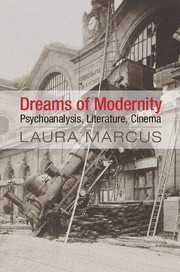Book contents
- Frontmatter
- Dedication
- Contents
- Acknowledgements
- Introduction
- Chapter 1 The Lodger
- Chapter 2 Oedipus Express
- Chapter 3 Railway Reading
- Chapter 4 ‘From Autumn to Spring, Aesthetics Change’
- Chapter 5 ‘A Hymn to Movement’
- Chapter 6 Staging the ‘Private Theatre’
- Chapter 7 The Newness of the ‘New Biography’
- Chapter 8 European Witness
- Chapter 9 Dreaming and Cinematographic Consciousness
- Chapter 10 Directed Dreaming
- Chapter 11 ‘In the Circle of the Lens’
- Chapter 12 Virginia Woolf and the Art of the Novel
- Index
- References
Chapter 8 - European Witness
Analysands Abroad in the 1920s and 1930s
Published online by Cambridge University Press: 05 November 2014
- Frontmatter
- Dedication
- Contents
- Acknowledgements
- Introduction
- Chapter 1 The Lodger
- Chapter 2 Oedipus Express
- Chapter 3 Railway Reading
- Chapter 4 ‘From Autumn to Spring, Aesthetics Change’
- Chapter 5 ‘A Hymn to Movement’
- Chapter 6 Staging the ‘Private Theatre’
- Chapter 7 The Newness of the ‘New Biography’
- Chapter 8 European Witness
- Chapter 9 Dreaming and Cinematographic Consciousness
- Chapter 10 Directed Dreaming
- Chapter 11 ‘In the Circle of the Lens’
- Chapter 12 Virginia Woolf and the Art of the Novel
- Index
- References
Summary
The emigration, voluntary or enforced, of psychoanalysts from central Europe to Britain and the US from the 1930s onwards has been explored in depth and detail over the last decades, with important work on, among related topics, ‘Freud in exile’. Less fully documented and explored are the experiences, in the 1920s and 1930s, of those British analysands and trainee analysts who travelled to Vienna, Berlin or Budapest in order to be analysed by ‘the masters’, including Freud in Vienna, Sándor Ferenczi in Budapest, and Karl Abraham and Hanns Sachs in Berlin. While it is recognized that this was a familiar pattern in the training of early British analysts, the particularities of their experiences abroad (as well as those of analysands who were ‘patients’ rather than ‘pupils’, to use Freud’s distinction) appear not to have been a significant focus of interest. This chapter is a preliminary exploration of this topic, and focuses on the activities of the Stracheys, particularly Alix Strachey, and of the writers Bryher and H.D., in the Berlin of the mid-1920s and the Berlin and Vienna of the late 1920s and early 1930s respectively.
Psychoanalysis developed as an international movement in the first two decades of the twentieth century, with the first International Psycho-Analytic Congress, held in Salzburg in 1908, attended by participants from America (A.A. Brill), Austria, England (Ernest Jones and Wilfred Trotter), Germany, Hungary and Switzerland. (Of the forty participants named by Ernest Jones, there is only one woman, Frieda Gross, wife of the analyst Otto Gross, from Austria.) Jones also notes the occurrence of the first training analysis in 1907, that of Max Eitingon by Freud. Jones himself was a frequent visitor to Vienna, in these early years and beyond; David Eder, with Jones, one of the first medical doctors to use psychoanalysis in his treatment, came to Vienna for a three-week analysis in early 1913, though Freud, too busy with other patients to take him on, referred him to Viktor Tausk. In 1913, Eder also became the Secretary of the newly founded Branch Society in London of the International Association of Psychoanalysis, with Jones as President.
- Type
- Chapter
- Information
- Dreams of ModernityPsychoanalysis, Literature, Cinema, pp. 151 - 177Publisher: Cambridge University PressPrint publication year: 2014
References
- 1
- Cited by



